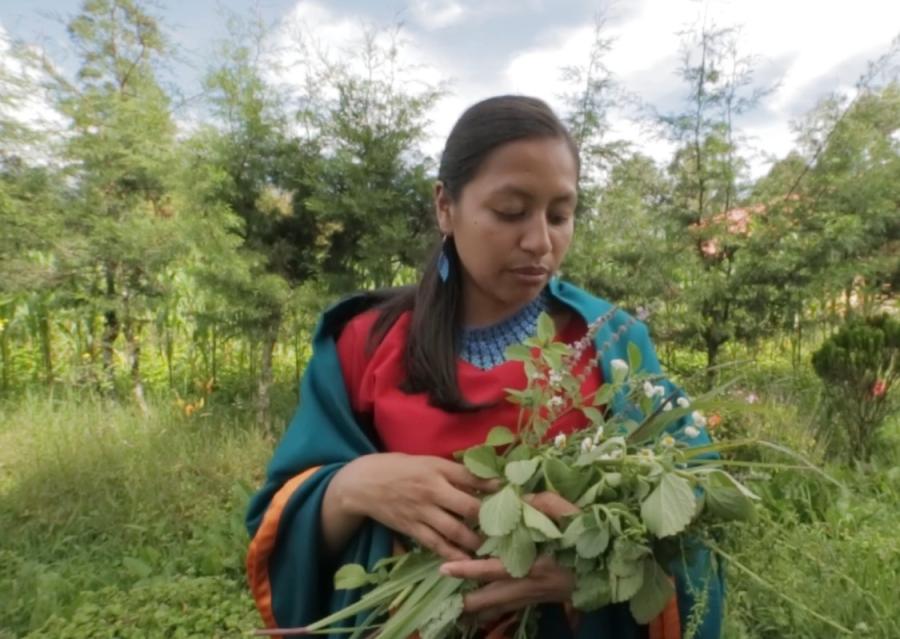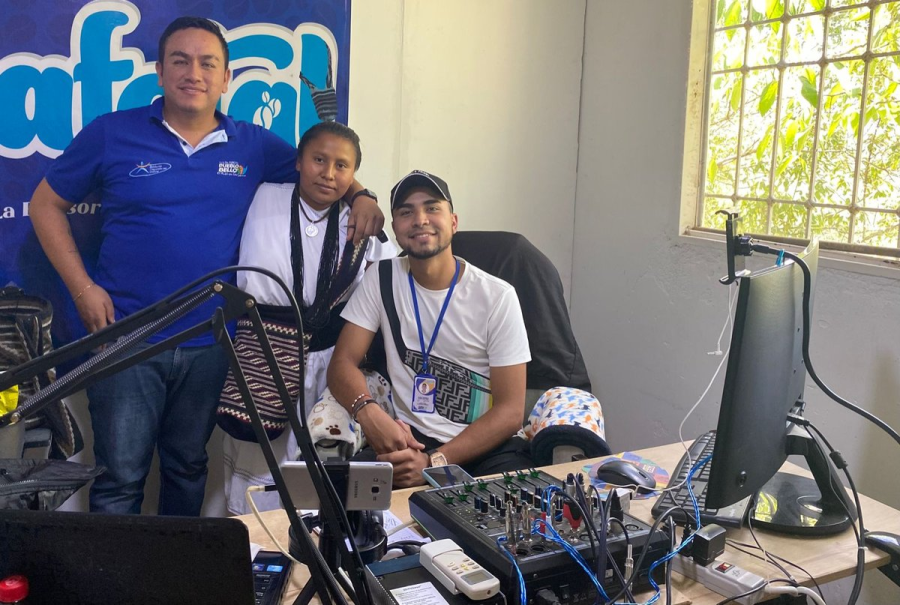Colombia is home to approximately 80 indigenous tribes with more than 700,000 members. (Kotler, 1999) The U'wa now number 5,000 people, and live on their ancestral ground in Colombia, near the Venezuelan boarder. According to John Vidal, "They have lived in the foothills and cloudforests of the Andes in northeast Colombia since, they believe, the world began, and had only limited contact with the outside world until 40 years ago." (Project Underground, www.moles.org) In those forty years, they have lost some 15,000 members of their community.
In 1992, Occidental Petroleum Corporation (Oxy) and Royal Dutch Shell got permission from the Colombian government (a partner in the project) to look for oil on the U'wa's land, called the Samore Block by Oxy. Royal Dutch Shell has since withdrawn from the partnership, but Oxy has remained interested. The project is estimated to yield 1.5 billion barrels of oil, an amount that would meet U.S. consumption levels for only three months. (U'wa Defense Working Group, 2001) This estimate is probably high, considering the history of oil pipelines in the region. In order to hinder the Colombian economy, guerillas of the Revolutionary Armed Forces of Colombia (FARC) -- the rebel force that has been fighting the Colombian government for the past half-century with a militia of 8,000 -- have been bombing Oxy's pipelines. (U'wa Defense Working Group, 1998) "In the past 12 years, Oxy's Cano Limon pipeline has been attacked more than 600 times, spilling more than two million barrels of crude oil into the forest and rivers (eight times the amount spilled by the Exxon Valdez)." (U'wa Defense Working Group, 2001)
The U'wa have begun to take action. In December 1996, the members of the traditional U'wa Authority published U'wa Chita, a document identifying the U'wa, where they live, and the problems their country faces, including the Oxy proposal.(1) On May 4, 1997, the case of the U'wa was brought to the world's attention when Berito Cobaria, president of the Traditional U'wa Authority, proclaimed, "[We] would rather die, protecting everything that we hold sacred, than lose everything that makes us U'wa.''(2) The U'wa then published Blood of Our Mother, a compelling piece about their struggle against Oxy and the Colombian government. It was presented to the media as a press release on August 18, 1998.
The U'wa have made great progress in their fight against Oxy by accessing the media and thus educating the public. They have founded the U'wa Defense Working Project as well as the U'wa Defense Working Group, and have created an internet Web site dedicated to their struggle. A number of non-governmental organizations (NGOs) -- Project Underground, Amazon Watch, and the Rainforest Action Network -- have been actively supporting and working with the U'wa. These groups, together with the U'wa, have arranged 75 protests against Fidelity Investments, the company holding the most shares in Oxy at the time. As a result, Fidelity sold more than 18 million Oxy shares, which represented 60 percent of Fidelity's overall holdings -- worth more than $400. million dollars -- in the company. The U'wa and their supporters have since organized several demonstrations at the New York City headquarters of Sanford Bernstein & Co. (now Bemstein Alliance Capital), which has become the largest Oxy stockholder.
The U'wa have also used non-violent tactics -- such as roadblocks and sit-ins by the drill sites -- to prevent drilling. Demonstrations have included U'wa members, local farmers (campesinos), union members, students, and members of NGOs, and have taken place in front of Oxy and government buildings in Colombia and other countries. Thousands of sympathizers are working with the U'wa to fight Occidental even though sit-ins and non-violent demonstrations often end in physical harm by military forces or other government-employed bodies. In a February interview with The San Francisco Bay Guardian, U'wa President Roberto Perez discussed the U'wa's recent encounters with oil-related violence: "The minister of the interior ordered oil exploration in the Samore mountains in January [of last year], and it has already cost us the lives of several of our children. Three died and 11 disappeared in February [2000]. We blocked the highway so [Occidental Petroleum] couldn't access our territory. The government responded by sending heavily armed riot police, who shot at the demonstrators. The oil development had not even begun. Despite this aggression, the blockade was rebuilt, and just three days after that attack, heavily armed Colombian soldiers came to a mountain by Cubara (U'wa territory) to break up the Indian demonstrators. They forced 26 Indians onto the waiting choppers and scattered perhaps 100 others. Some 300 soldiers took up positions to ensure they wouldn't return." (Semple, 2000)
A crucial aspect of the U'wa's plight is the lack of legal proof that they own their traditional territory. In 1999, the Colombian government recognized part of the U'wa's land, but this part constituted only 14 percent of their territory, and did not include the piece on which Oxy intended to drill. The U'wa responded by buying pieces of land that were already part of their traditional territorial grounds. On September 14, 2000, the U'wa presented the Colombian government with archival evidence of colonial titles from 1661 that the U'wa claim uphold their soil (and subsoil) rights to their ancestral territory. (U'wa Defense Working Group, 2001) In January 2000, the notary who signed the land deeds the U'wa had bought was found murdered. In February, Oxy and the Colombian military forcibly evicted the U'wa from the drill site. The government later admitted that this eviction was illegal. The court nevertheless allowed Oxy to continue its search for oil.
The tribe has brought their case to the Colombian courts numerous times, and has petitioned the U.S. Department of State and the Inter-American Commission on Human Rights of the Organization of American States (OAS). (Friends of the Earth, 1999) On the two occasions that the U'wa met with the Colombian government, they were unsuccessful in halting Oxy's exploration. The expansion of U'wa land borders was a success, but the government has since done little to protect their rights. It is clear, though, that the U'wa are being heard, if not by their country's government, then by others. On September 30, 2000, Stephano Boco, Senator for the Italian Green Party, announced that the Green Party of Europe is prepared to bring the U'wa's case to the Hague Tribunal and to have a "permanent presence in U'wa territory." (Project Underground, 2001)
Unfortunately, world leaders and organizations have contributed to the Uwa's problems. On January 11, 2000, the United States offered Colombia 1.5 billion in aid to strengthen Colombian military and security forces.(3) This U.S. intervention increases the danger to indigenous people in Colombia, who are currently having problems with the government's support of activities like oil exploration. Conditions ensuring human rights, which had accompanied this aid, were removed, ostensibly to further the war on drugs. To make matters worse, on August 3, 2000, the International Monetary Fund implemented a series of requircments for Colombia, including stipulations that the country speed up oil exploration and be more welcoming to oil companies.
The U'wa tribe is fighting the environmental and human injustices that Oxy continues to commit against their people and their land. Their media campaigns, public education drives, and demonstrations have yielded successful results. The U'wa implore us to aid them in saving their Mother Earth: "We are seeking an explanation for this `progress' that goes against life. We are demanding that this kind of progress stop, that oil exploitation in the heart of the earth is halted, that bleeding of the Earth stop."
References & further reading
Friends of the Earth (1999, April). Fact Sheet: The U'wa: Occidental Shareholder Briefing.
Kotler, J. (1999, April 10). Indians Caught in Colombian War. Associated Press.
Project Underground (1998, April 7). U'wa in Crisis: A Brief Summary of the U'wa Story of Petroleum.
Project Underground (2001, April 13). The U'wa Struggle Continues: a Chronological Update as of March 2001.
Semple, K. (2000, February 14). The U'wa's last stand: Colombian Indians vs. Occidental Petroleum. U.S. News and World Report.
U'wa Defense Working Group (1998, August 18). Blood of Our Mother. Press Release.
U'wa Defense Working Group (2001, March). The U'wa threatened by occidental petroleum.
(1). "U'wa In Crisis: A Brief Summary of the U'wa Story of Petroleum." April 7, 1998.
(2). Amazon Watch (member of the U'wa Defense Working Group) ad titled "Who is AI Gore? Environmental champion or petroleum politician? The U'wa People need to know." Appeared in The New York Times on March 6, 2000.
(3). Statement by Madeleine K. Albright on U.S. Assistance to Colombia in Washington, D.C. on January 11, 2000.
Article copyright Cultural Survival, Inc.


